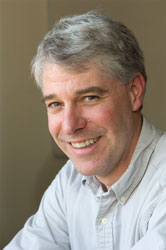Future of the World’s Greatest Forest Topic of MBL “Science Before Supper” Season Opener

Contact: Susan Joslin
508-289-7281; sjoslin@mbl.edu
Woods Hole, MA–The MBL Associates and the Falmouth Public Library are pleased to announce the third season of “Science Before Supper,” a series of talks given by Marine Biological Laboratory (MBL) scientists. The free talks, designed especially for non-scientists, will be held in the library’s Hermann Foundation Meeting Room, 300 Main Street, Falmouth at 5:00 PM. The short presentations are followed by a time for questions and answers. Light refreshments will be served.

This year’s series will kick off on Thursday, December 18 with Christopher Neill, Director of the MBL’s Ecosystems Center, who will present “Amazon Soybeans, China, and the Future of the World’s Greatest Forest.”
The Amazon Basin of Brazil contains the earth’s largest tropical rainforest. Since the 1990s, intensive cropping systems, especially for soybeans, have replaced cattle ranching as the major use of deforested lands, creating the world’s largest agricultural frontier. China is now the major buyer of exported Amazon soybeans. Neill will discuss how this new cropping system influences the regional to global environment and how environmental responses in this important tropical region differ from those found in the much better-studied temperate zone.
Neill is an ecologist, Senior Scientist, and Director of the MBL Ecosystems Center. He is also the Rosenthal Director of the Brown-MBL Partnership and the Brown-MBL Graduate Program in Biological and Environmental Sciences. Neill was a Fulbright Scholar at the University of São Paulo in 2007 and received a Harvard University Bullard Fellowship in 2010. His NSF-sponsored research in Brazil includes collaborators at MBL, the University of São Paulo, the Woods Hole Research Center, Brown University and the Institute for Amazon Environmental Research. Neill has a long-standing interest in communicating ecological science to a general audience. He is a long-time Director of the Environmental section of MBL’s Science Journalism Program and wrote a monthly column about Cape Cod environmental science and policy in the Falmouth Enterprise newspaper for 16 years. Neill also served as President of Falmouth Associations Concerned with Estuaries and Salt Ponds and on the board of the Association to Preserve Cape Cod. He currently serves on the board of the Buzzards Bay Coalition, oversees the Coalition’s long-term nutrient monitoring of 30 Buzzards Bay estuaries, and directs their Science Advisory Committee.
Visit mbl.edu/science-before-supper for details and updated information. You may also contact the MBL Communications Office at (508) 289-7423 or comm@mbl.edu.
The remainder of the 2015-2016 season includes the following:
January 8, 2015
Exploding Volcanoes and Microbial Life in the Deep Sea
Julie Huber, Associate Director, Bay Paul Center, MBL
February 19, 2015
Interrogating a Microbial Planet
Mitch Sogin, Senior Scientist, Bay Paul Center, MBL
—###—
The Marine Biological Laboratory (MBL) is dedicated to scientific discovery and improving the human condition through research and education in biology, biomedicine, and environmental science. Founded in Woods Hole, Massachusetts, in 1888, the MBL is a private, nonprofit institution and an affiliate of the University of Chicago.
The MBL Associates are a group of individuals and businesses that support the scientific mission of the MBL through their gifts to the Annual Fund. The Associates sponsor educational and research programs for the MBL and raise funds for special projects. In addition, they operate the MBL Gift Shop, located on Water Street in Woods Hole, the profits from which support scientific fellowships.